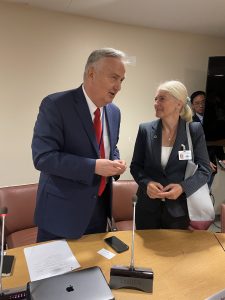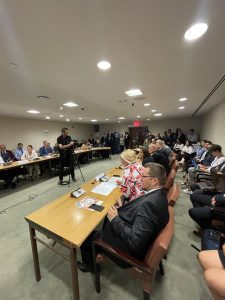High-Level Meeting on Financing Frameworks and Sustainable Development Goals Convenes at the United Nations
New York, July 18, 2023 – A high-level meeting on Financing Frameworks and Sustainable Development Goals (SDGs) was jointly organized by Bosnia and Herzegovina, the Republic of Indonesia, the Republic of Serbia, Sweden – Sida, and the United Nations Development Programme (UNDP). The meeting, held at the United Nations headquarters, aimed to address the urgent need for effective financing mechanisms to achieve the SDGs.
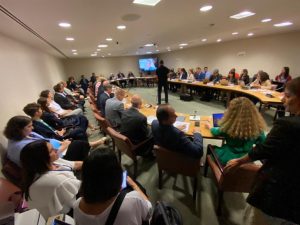
The event, which took place on the sidelines of the High-level Political Forum 2023, shed light on the critical role of financing frameworks in realizing the SDGs. H.E. Dr. Zlatko Lagumdžija, the Permanent Representative of Bosnia and Herzegovina to the United Nations, chaired the meeting, featuring prominent speakers and participants.
In his opening remarks, Dr. Lagumdžija emphasized the pressing importance of overcoming severe financing constraints faced by developing countries, exacerbated by the COVID-19 pandemic and the war in Ukraine. He stated,
“The Sustainable Development Goals still need to be achieved. Success is held back by severe financing constraints facing the developing countries: constraints that have been gravely aggravated by the COVID-19 pandemic and the war in Ukraine. Besides preserving peace and lowering geopolitical tensions, the key to achieving the SDGs is having a plan to finance them.”
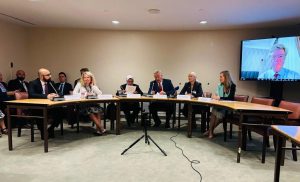 Among the distinguished speakers was Mr. Jeffrey Sachs, President of the U.N. Sustainable Development Solutions Network, who served as the keynote speaker. Mr. Sachs drew attention to the inadequacies of the current international financial architecture in supporting poorer countries, stressing the need for a new financial framework to effectively meet the SDGs. While acknowledging the existence of technological capabilities to achieve the SDGs, he underscored the crucial role of financing, urging governments to devise bold investment programs aligned with the SDGs.
Among the distinguished speakers was Mr. Jeffrey Sachs, President of the U.N. Sustainable Development Solutions Network, who served as the keynote speaker. Mr. Sachs drew attention to the inadequacies of the current international financial architecture in supporting poorer countries, stressing the need for a new financial framework to effectively meet the SDGs. While acknowledging the existence of technological capabilities to achieve the SDGs, he underscored the crucial role of financing, urging governments to devise bold investment programs aligned with the SDGs.
During the meeting, high-level panelists discussed financing strategies, policies, and instruments necessary to accelerate sustainable development as the world approaches the midpoint of the SDG timeline to 2030.
H.E. Ms. Jelena Begović, Minister of Science, Technological Development, and Innovation of the Republic of Serbia, shared Serbia’s experiences and perspectives on attractable investments for the private sector and foreign direct investments as significant sources to meet the SDGs.
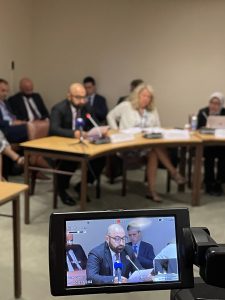 Mr. Muhamed Hasanović, Acting Minister of Finance and Treasury of Bosnia and Herzegovina, expressed gratitude to the UNDP and Sida for their joint efforts in developing the SDG Framework, a common platform for sustainable development in the country. He stressed the necessity of increased funding and unlocking private investments to overcome the challenges in accelerating SDG progress. Hasanović highlighted digitalization, research and development, and decarbonization as essential elements for achieving the SDGs, presenting them as high-potential areas for investment.
Mr. Muhamed Hasanović, Acting Minister of Finance and Treasury of Bosnia and Herzegovina, expressed gratitude to the UNDP and Sida for their joint efforts in developing the SDG Framework, a common platform for sustainable development in the country. He stressed the necessity of increased funding and unlocking private investments to overcome the challenges in accelerating SDG progress. Hasanović highlighted digitalization, research and development, and decarbonization as essential elements for achieving the SDGs, presenting them as high-potential areas for investment.
Ms. Laurel Patterson, Head of the SDG Integration Team at the Bureau for Policy and Programme Support of the UNDP, emphasized the critical role of financing and scientific evidence in addressing development challenges. She highlighted the importance of national-level strategies as drivers of change.
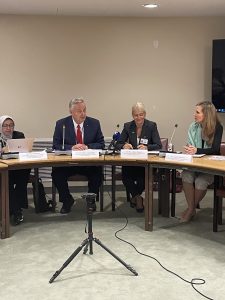 In his closing remarks, H.E. Dr. Zlatko Lagumdžija underlined the unprecedented challenges faced by the world at the midpoint to 2030, hindering progress towards the SDGs. He acknowledged the global nature of these challenges, with the COVID-19 pandemic and the war in Ukraine causing unforeseen economic shocks, particularly affecting the most vulnerable populations. Dr. Lagumdžija emphasized the urgent need for systemic, integrated, and innovative solutions to counter these challenges, urging the development of strong institutions and policies aligned with the 2030 Agenda.
In his closing remarks, H.E. Dr. Zlatko Lagumdžija underlined the unprecedented challenges faced by the world at the midpoint to 2030, hindering progress towards the SDGs. He acknowledged the global nature of these challenges, with the COVID-19 pandemic and the war in Ukraine causing unforeseen economic shocks, particularly affecting the most vulnerable populations. Dr. Lagumdžija emphasized the urgent need for systemic, integrated, and innovative solutions to counter these challenges, urging the development of strong institutions and policies aligned with the 2030 Agenda.
To reshape the global economic model and achieve the SDGs, Dr. Lagumdžija called for tailor-made financing frameworks to play a central role. He emphasized that achieving the SDGs is fundamentally an investment agenda, requiring investments in physical infrastructure and human capital. The current financial architecture must be restructured to mobilize additional financing, transforming existing approaches and instruments. Dr. Lagumdžija emphasized the need to attract not only governments but also private and international and domestic financing institutions, developing pragmatic and meaningful instruments. He further highlighted four practical pathways for SDG financing:
- Increasing domestic tax revenues for the SDGs.
- Increasing sovereign borrowing from international financial institutions for the SDGs.
- Increasing sovereign borrowing from international private capital markets.
- Increasing and targeting official development assistance.
The expanded SDG financing should be directed towards six major transformations aimed at achieving specific SDGs, including education and social protection, health systems to prevent future pandemics and ensure universal healthcare coverage, zero carbon energy and circular economy, sustainable urban infrastructure, universal digital services, and sustainable food.
With time running out, the global community must redouble its efforts to mobilize financing and reshape the financial architecture to achieve the ambitious Sustainable Development Goals by 2030. The meeting concluded with a call to action for all stakeholders to work collaboratively towards the implementation of effective financing frameworks and sustainable development strategies.

